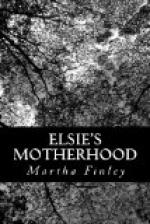“True enough,” said Travilla, “I know not of her like in all the length and breadth of the land.”
Catching sight of Mr. Dinsmore pacing the veranda alone, Calhoun slipped quietly away from the rest and joined him.
“Uncle,” he said, coloring and dropping his eyes, “I think you doubt me.”
“Have I not reason, Calhoun?” Mr. Dinsmore asked, looking searchingly into the lad’s face.
“Yes, sir, I own that appearances are strongly against me, and I can not disprove the tale they tell; but—oh, if you could trust me still, uncle!”
He lifted his head, and gazed fearlessly into the keen dark eyes still bent searchingly upon him.
Mr. Dinsmore held out his hand, and cordially grasped the one Calhoun placed in it.
“Well, my boy, I will try: it is far pleasanter than to doubt you. But there is some one at Roselands who is disposed to aid and abet the Ku Klux in their lawless proceedings.”
“I can not deny that,” said the nephew, “yet it would ill become me to say who it is; and I think, sir, since grandpa has set down his foot so decidedly in opposition, there will be no more of it. Travilla and Cousin Elsie have given me their confidence again, and I assure you, sir, I am deeply grateful to you all.”
Chapter Twelfth.
“If thou neglect’st, or dost unwillingly
What I command, I’ll rack thee with old cramps,
Fill all thy bones with aches; make thee roar,
That beasts shall tremble at thy din.”
—SHAKESPEARE’S TEMPEST.
The Ion family were spending the day at the Oaks. It was now early in the fall of 1868 and political excitement ran high over the coming presidential election. There had been as yet no effectual check given to the lawless proceedings of the Ku Klux, and their frequent raids and numerous deeds of violence had inaugurated a reign of terror that was a shame and reproach to our boasted civilization and free institutions.
Many of the poorer class, both blacks and whites, dared not pass the night in their houses, but when darkness fell, fled for safety to the shelter of the nearest woods, carrying their beds with them, and sleeping in the open air.
That the Ku Klux Klan was a political organization working in the interests of the Democratic party, their words to their victims left no doubt. The latter were told that they were punished for belonging to the Union League or for favoring the Republican party or using their influence in its behalf, and threatened with severer treatment if they dared vote its ticket or persuade others to do so.
The outrages were highly disapproved by all Republicans and by most of the better class in the opposite party; but many were afraid to express their opinions of the doings of the Klan, lest they should be visited with its terrors; while for the same reason, many of its victims preferred to suffer in silence rather than institute proceedings, or testify against their foes.




